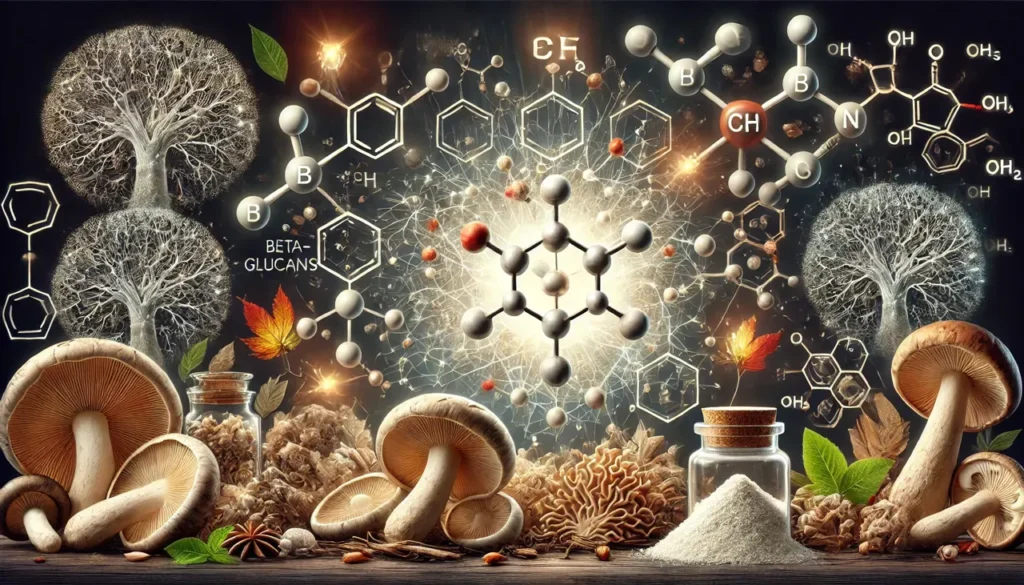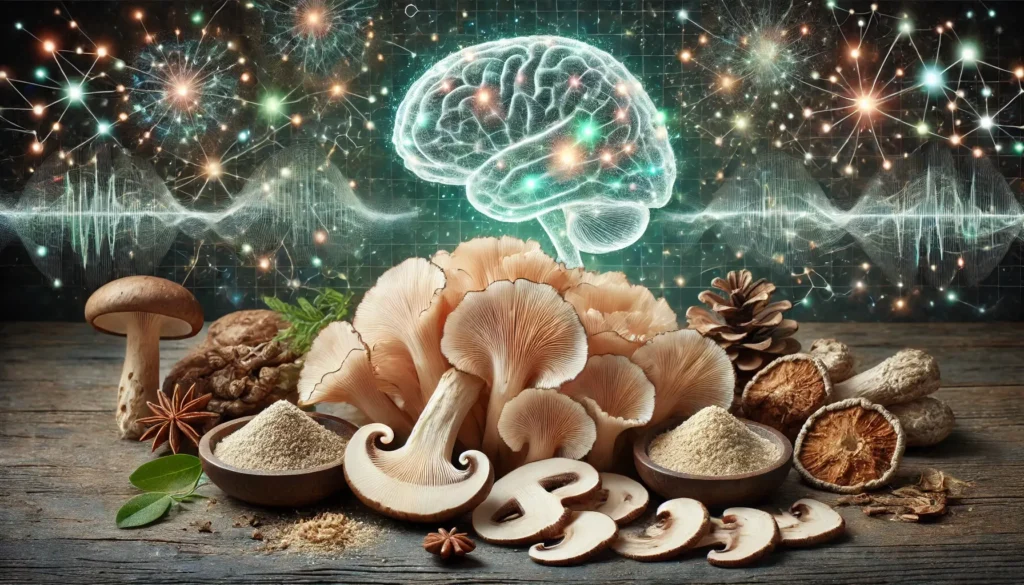Maitake mushroom, also known as Grifola frondosa, is a medicinal mushroom renowned for its potential health benefits. Traditionally used in Eastern medicine, this unique fungus has gained increasing attention for its role in promoting immune function, regulating blood sugar, and enhancing cognitive performance. While Maitake mushroom is commonly recognized for its overall health-boosting properties, it is now being explored for its potential as a nootropic supplement. This article delves into the scientific understanding of Maitake mushroom, its chemistry, physiological mechanisms, and nootropic benefits, alongside its dosing guidelines, side effects, and interactions with other supplements and medications.
You May Also Like:
Reishi Mushroom: Potential Nootropic Benefits, Dosage, Side Effects, Interactions, and Other Important Information About This Supplement
Poria Mushroom: Potential Nootropic Benefits, Dosage, Side Effects, Interactions, and Other Important Information About This Supplement
Sources of Maitake Mushroom
Maitake mushrooms are native to Japan, where they are traditionally harvested from the wild. The name “Maitake” translates to “dancing mushroom” in Japanese, attributed to the joy and excitement experienced by those who discovered its abundance. While Maitake mushrooms can still be found growing in forests, they are now cultivated for commercial use due to their high demand as both a food and medicinal supplement.
In addition to their culinary use in soups, stir-fries, and other dishes, Maitake mushrooms are available in various supplement forms, including powdered extracts, capsules, and tinctures. The active compounds of Maitake, particularly its polysaccharides, beta-glucans, and other bioactive molecules, are concentrated in these supplements to provide a higher dosage of its medicinal properties.
Boost Energy Metabolism and Improve Brain Wellness with Maitake Mushrooms—Buy Now on Amazon!

Chemistry of Maitake Mushroom
The key active compounds in Maitake mushrooms are polysaccharides, with beta-glucans being the most prominent. Beta-glucans are complex carbohydrates that have demonstrated a wide range of biological effects. These compounds play a significant role in the immune system, helping modulate immune responses and exert anti-inflammatory effects. In addition to beta-glucans, Maitake mushrooms contain terpenoids, sterols, and various phenolic compounds, which contribute to their antioxidant, anti-inflammatory, and neuroprotective properties.
The chemical structure of beta-glucans in Maitake mushrooms is characterized by β-D-glucan linkages, which are responsible for their biological activities. These compounds interact with immune receptors in the body, stimulating immune cells such as macrophages and natural killer (NK) cells, enhancing the body’s ability to fight infections and inflammation. Furthermore, Maitake mushrooms also contain ergosterol, a precursor to vitamin D2, which is converted in the body to its active form, contributing to bone health and immune function.

Physiological Mechanisms of Maitake Mushroom in the Body and Brain
Maitake mushrooms influence several physiological processes in the body, primarily through their immune-modulating effects. The beta-glucans found in Maitake interact with receptors in the gastrointestinal tract and immune system, such as the Dectin-1 receptor and Toll-like receptors. This interaction activates signaling pathways that enhance the body’s defense mechanisms, improve anti-inflammatory responses, and bolster overall immune health.
While Maitake mushrooms are widely studied for their immune-boosting properties, recent research has also explored their effects on cognitive function. The beta-glucans, along with other bioactive compounds in Maitake, exhibit antioxidant and neuroprotective properties, which may help mitigate oxidative stress in the brain. Oxidative stress is a significant contributor to neurodegenerative diseases and cognitive decline, so substances that protect against this process are of great interest in the field of nootropics.
Additionally, Maitake mushrooms may influence brain function through their regulation of blood sugar. Studies have shown that Maitake helps modulate blood glucose levels by enhancing insulin sensitivity and lowering the post-meal rise in blood sugar. Since blood sugar imbalances can have a profound impact on brain function, the ability of Maitake to regulate glucose may further enhance its potential as a nootropic.
Support Healthy Metabolism and Cognitive Performance with Maitake Mushrooms—Shop Amazon’s Best Now!

Nootropic Benefits of Maitake Mushroom
As a nootropic, Maitake mushroom shows promise in improving various aspects of cognitive function. Its ability to enhance memory, focus, and overall brain health can be attributed to its antioxidant properties, immune-modulating effects, and metabolic support. The following are key nootropic benefits of Maitake mushroom:
- Neuroprotective Effects: The antioxidant activity of Maitake mushrooms helps reduce oxidative stress in the brain, which is a contributing factor in cognitive decline and neurodegenerative conditions such as Alzheimer’s disease and Parkinson’s disease. By neutralizing free radicals, Maitake mushrooms may help protect brain cells from damage, thus supporting long-term cognitive health.
- Improved Cognitive Function: Maitake’s ability to modulate blood sugar levels may also contribute to improved cognitive function. Stable blood glucose levels are essential for maintaining mental clarity, concentration, and memory. By supporting insulin sensitivity, Maitake mushrooms may help optimize brain metabolism, potentially improving focus and learning abilities.
- Mood Enhancement: Preliminary research suggests that Maitake mushrooms may have mood-enhancing properties. While not a primary treatment for mood disorders, the anti-inflammatory and immune-modulating effects of Maitake may help reduce stress and support emotional well-being, indirectly benefiting cognitive performance.
- Memory Support: Some studies have indicated that Maitake may have a positive impact on memory retention. The neuroprotective and metabolic effects of Maitake could contribute to better memory consolidation, which is crucial for learning and recall.

Dosage and Supplementation Guidelines
There is no standardized dosage for Maitake mushroom as a nootropic, as its effects can vary depending on individual factors and the form of the supplement. However, typical dosages of Maitake mushroom extract range from 500 mg to 3,000 mg per day.
- General Dosage for Cognitive Enhancement: For general cognitive support, a typical dose of 500 mg to 1,500 mg per day is often recommended. This range can provide the neuroprotective and metabolic benefits of Maitake without exceeding safe limits.
- Therapeutic Dosage: In studies involving therapeutic effects, higher doses of Maitake extract (up to 3,000 mg per day) have been used. However, individuals considering higher dosages should consult a healthcare provider to ensure safety, especially if they have pre-existing health conditions.
- Forms of Supplementation: Maitake mushrooms are available in various forms, including powdered extract, capsules, and liquid tinctures. The extract form is often preferred for its higher concentration of bioactive compounds. Supplements that specify a standardized amount of beta-glucans (e.g., 30-40%) can provide more consistent therapeutic effects.
Promote Immune Defense and Improve Brain Focus with Maitake Mushroom Extract—Buy Now on Amazon!

Side Effects and Safety
Maitake mushrooms are generally considered safe for most individuals when used in moderation. However, some individuals may experience mild gastrointestinal discomfort, including bloating, nausea, or diarrhea, especially when taking higher doses. These side effects are typically transient and resolve as the body adjusts to the supplement.
- Allergic Reactions: While rare, allergic reactions to Maitake mushrooms can occur. Symptoms may include rash, itching, or difficulty breathing. Individuals with mushroom allergies should avoid Maitake supplements.
- Digestive Disturbances: Some individuals may experience mild digestive issues, particularly when taking large doses. It is advisable to start with a lower dose and gradually increase it to avoid gastrointestinal discomfort.
- Interaction with Blood Sugar Medications: Maitake mushrooms may lower blood sugar levels, which could enhance the effects of insulin or other blood sugar-lowering medications. Individuals on such medications should consult their healthcare provider before using Maitake supplements to avoid hypoglycemia.
Interactions with Other Supplements and Medications
Maitake mushrooms may interact with other supplements and medications, especially those that affect blood sugar or immune function. Potential interactions include:
- Blood Sugar-Lowering Medications: Since Maitake can lower blood sugar levels, it may enhance the effects of insulin and other hypoglycemic drugs. This could increase the risk of low blood sugar (hypoglycemia), especially in individuals on medication for diabetes.
- Immunosuppressive Drugs: Maitake mushrooms have immune-stimulating properties, so they may interfere with the effectiveness of immunosuppressive medications, which are often used by individuals undergoing organ transplants or those with autoimmune disorders. It is essential to consult a healthcare provider before using Maitake supplements in these cases.
- Other Nootropics: Maitake mushrooms can be combined with other nootropics, such as Rhodiola rosea or Bacopa monnieri, to support cognitive function. However, individuals should monitor their response to these combinations to ensure they are not overstimulating the body, which could lead to adverse effects like headaches or fatigue.

Risks for Individuals with Certain Health Conditions
While Maitake mushrooms are generally safe for most individuals, those with certain health conditions should exercise caution. For example, individuals with a history of allergic reactions to mushrooms should avoid using Maitake supplements. Additionally, those with blood sugar disorders should carefully monitor their glucose levels when taking Maitake, as it may alter insulin sensitivity and blood sugar regulation.
Conclusion: Should You Consider Maitake Mushroom as a Nootropic?
Maitake mushroom offers promising potential as a nootropic supplement. Its neuroprotective, metabolic, and immune-enhancing properties make it an intriguing option for those looking to improve cognitive function, memory, and overall brain health. While more research is needed to fully understand its mechanisms and efficacy as a nootropic, Maitake mushrooms are generally safe when taken in appropriate dosages.
As with any supplement, it is important to consult with a healthcare provider before starting Maitake mushroom supplementation, particularly for individuals with existing medical conditions or those taking medications that may interact with the mushroom. When used responsibly, Maitake mushrooms may be a valuable addition to a nootropic regimen, supporting both cognitive and overall health.

References:
- Unveiling the full spectrum of maitake mushrooms: A comprehensive review of their medicinal, therapeutic, nutraceutical, and cosmetic potential. Retrieved from: https://pmc.ncbi.nlm.nih.gov/articles/PMC11068609/
- Bioactive Ingredients and Medicinal Values of Grifola frondosa (Maitake). Retrieved from: https://pmc.ncbi.nlm.nih.gov/articles/PMC7824844/
- Everything You Need to Know About Maitake Mushroom. Retrieved from: https://www.verywellhealth.com/maitake-mushroom-benefits-nutrition-8606730
- Maitake Mushroom Benefits Blood Sugar, Cholesterol, Immunity & More. Retrieved from: https://draxe.com/nutrition/maitake-mushroom/
- Polysaccharides in Grifola frondosa mushroom and their health promoting properties: A review. Retrieved from: https://pubmed.ncbi.nlm.nih.gov/28366857/
Important Note: The information contained in this article is for general informational purposes only, and should not be construed as health or medical advice, nor is it intended to diagnose, prevent, treat, or cure any disease or health condition. Before embarking on any diet, fitness regimen, or program of nutritional supplementation, it is advisable to consult your healthcare professional in order to determine its safety and probable efficacy in terms of your individual state of health.
Regarding Nutritional Supplements Or Other Non-Prescription Health Products: If any nutritional supplements or other non-prescription health products are mentioned in the foregoing article, any claims or statements made about them have not been evaluated by the U.S. Food and Drug Administration, and such nutritional supplements or other health products are not intended to diagnose, treat, cure, or prevent any disease.


